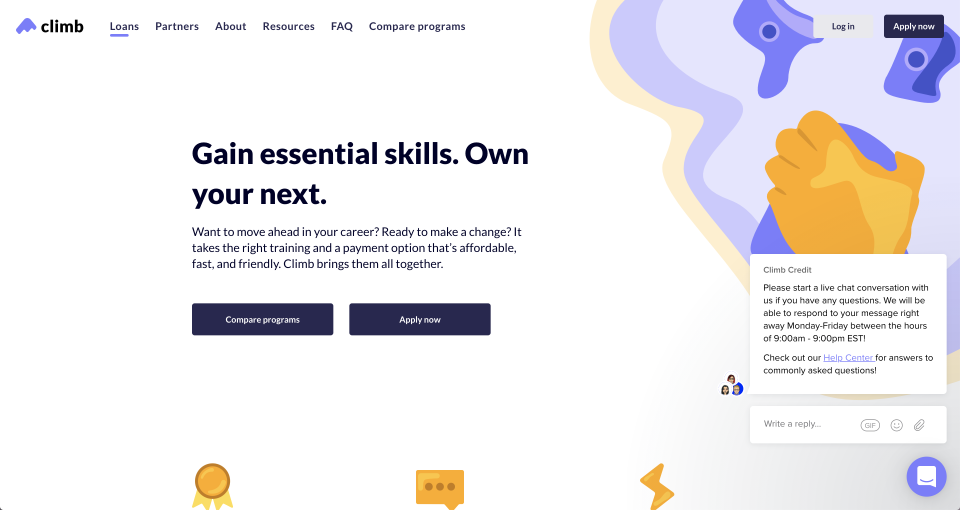Student loan watchdog accuses lender Climb Credit of 'troubling tactics'
This story has been updated to add comments from Climb Credit.
A nonprofit student loan watchdog is accusing private lender Climb Credit of engaging in tactics that misrepresent educational programs and projected earnings while steering borrowers towards for-profit schools, Yahoo Finance has learned.
The report by D.C.-based Student Borrower Protection Center (SBPC) found that the New York-based fintech company’s practices “may place it in violation” of the Consumer Financial Protection Act and other consumer protection laws, according to details shared exclusively with Yahoo Finance.
SBPC alleged that Climb is partnering with for-profit schools to advertise questionable programs to users, misrepresenting projected earnings of various programs, and engaging in possible discrimination through their underwriting practices.

There is “a host of different really, really troubling tactics,” Seth Frotman, head of SBPC and a former top student loan official at the Consumer Financial Protection Bureau (CFPB), told Yahoo Finance.
Frotman noted that the “dangerous mix” of Climb’s questionable lending tactics — steering borrowers toward for-profit schools, hiding the true cost of student loans, as well as engaging in “educational redlining” — was really “a cause for concern.”
SBPC sent a letter to CFPB Director Kathy Kraninger on Wednesday outlining these issues, urging her to look into the company by using “all available enforcement and supervisory authority” so that borrowers don’t get misled or harmed.
In response to the letter, Climb Credit CEO Angela Galardi Ceresnie told Yahoo Finance that the company’s "mission is to empower and help individuals advance their careers and earning-potential through professional and skills-based training programs that demonstrate a commitment to the best interests of their students,” and that they “take any concerns about our business seriously.”
She added: "When I see that 92% of Climb borrowers report graduating from their respective program, 87% found employment post-graduation, and that those who were employed post-graduation reported a 69.2% median salary increase, I am confident that our model and education partners are unequivocally part of the solution."

For-profit college issue raised
One of SBPC’s allegations is related to Climb’s practice of offering loans in partnership with for-profit schools, which traditionally saddle students with particularly high levels of debt.
SBPC Letter Regarding Climb... by Aarthi
Climb claimed that it vets schools before marketing them on their website. However, SBPC noted that the description for the cosmetology program at the Salon Professional Academy of Melbourne — a small, for-profit school — was “cut-and-pasted from the school’s website,” which they alleged could be a violation of Regulation Z.
Regulation Z is a federal law that’s aimed at making the cost of borrowing clearer to consumers. It’s part of the “unique protections that were put in place by Congress to try to deal with the worst abuses that happened generally before the Great Recession,” Frotman explained. “Congress stepped in and put in place some guardrails governing this relationship [between schools and lenders]… so the worst of these practices would ultimately be curtailed.”
Climb’s Ceresnie disagreed with the characterization. "When it comes to identifying and partnering with schools and programs, we compare the cost and duration of the education program with the expected outcomes, including graduation rates, job placement rates, and expected salaries to ensure that students are not burdened with unsustainable debt loads and weak economic prospects,” Ceresnie stated. “Our partners create pathways for people that are accelerated and targeted toward real career results, including in technology and skills-based sectors — blanket condemnation of 'for-profit' programs is misleading for students.”
Another issue flagged by SPBC is that some of the programs recommended by Climb seem to mislead borrowers as to the qualification they’d receive. When a user looks to go into the teaching field, according to SPBC, they’d see that Climb “recommends” a Certificate in Teacher Education by the American College of Education.
But if the user takes the course, they won’t exactly get a license to become a teacher: The course was in fact for people who were already teachers. This practice is deceptive, the SBPC argued.
But "the idea that certain certificate programs will not help people grow in their careers is misguided, and fails to consider the most effective ways for our society to ensure our workforce has requisite skills for our modern economy,” Ceresnie responded.

SBPC argued that Climb also misrepresents projected earnings. A user who ends up taking the Paraprofessional Certification Program at the Career Pathways Institute is projected to make between $45,000 to $55,000, according to Climb. That earning estimation is based on data from PayScale, according to Climb. But when the SBPC looked at PayScale’s data, it couldn’t find an entry for the school.
“It therefore appears unlikely that PayScale is in fact Climb’s source for average graduate salary information for this particular program, making Climb’s practice of misrepresenting the data source for its income claim likely deceptive,” the SBPC stated in the letter to CFPB.
Ceresnie said that PayScale isn’t the only source of data the company looks at in making these estimates.
"When it comes to our posting of general educational information on projected career paths and earning potential on our public site, we rely on publicly available data as disclosed,” Ceresnie explained. “In our vetting process, we work directly with the school to gather student-level data, and then we verify with 3rd party data."

SBPC also argued that Climb’s underwriting model for their loans discriminates against borrowers based on where they go to school, possibly violating the Equal Credit Opportunity Act. (Judging a borrower’s ability to repay based on the school they attended is discriminatory, especially for women and minority borrowers, and adds on cost to loans.)
"We take compliance and our fair lending obligations very seriously,” responded Ceresnie. “We make our loan terms clear for students throughout the process. Additionally, all approved borrowers with the same FICO score receive the same interest rate.”
CFPB’s ‘job’ to regulate private lenders
The SBPC’s report is part of a larger investigation into private companies that offer loans for educational purposes but do not provide the same protections as federal student loans.
Keeping an eye on these companies is essential, especially right now during the recession, Frotman stressed, because “the risk of taking advantage of is … the highest” and there are “a host of players out there who have no qualms of loading up Americans with high-cost products and taking advantage of people who are just trying to find a better life.”
The CFPB, Frotman stressed, should be watching and regulating the private lending space.
“It’s their job to do this,” he said. “This is why the bureau was created… [Congress] gave it unique and specific authorities to go after actors just like these.”
And the tactics used by Climb Credit, according to Frotman, seem to be rooted in the type of deception seen after the Financial Crisis.
“No matter what you call yourself — a fintech company, a disruptor — the tactics… make it seem like you’re just cutting and pasting deception and fraud that’s been around for a long time.”
—
Aarthi is a reporter for Yahoo Finance. She can be reached at aarthi@yahoofinance.com. Follow her on Twitter @aarthiswami.
Read more:
'Educational Redlining': New report alleges discrimination against certain student loan borrowers
Income share agreements: Assessing the latest big idea for fixing the U.S. student loan crisis
'I can't afford that': Woman in student loan limbo since 1997 decries a muddy system
Read the latest financial and business news from Yahoo Finance
Follow Yahoo Finance on Twitter, Facebook, Instagram, Flipboard, SmartNews, LinkedIn, YouTube, and reddit.



